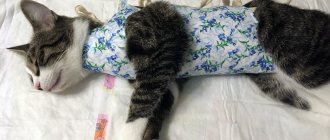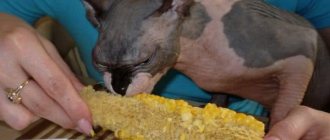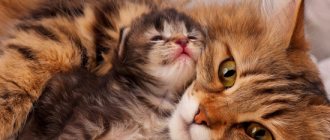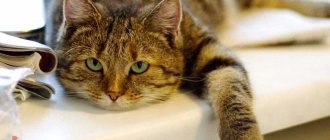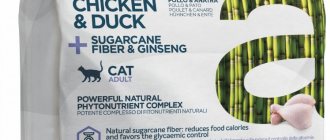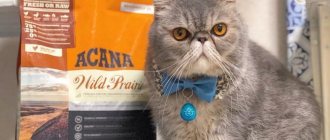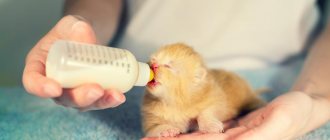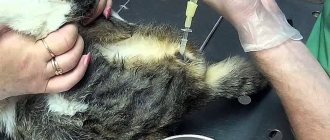Castration is a serious surgical intervention in the vital functions of an animal’s body. This is not just ridding the cat of sexual desire by removing the testicles. Such interventions have an impact on subsequent behavior, habits and functioning of the body. The owner needs to understand how to feed a castrated cat correctly, how to care for him, and what his needs are.
Changes in the body after castration
Domestic cats are castrated without asking their opinion, primarily to solve practical problems. An overly active and sometimes aggressive animal becomes calmer, sometimes even inert. In addition, the alpha male stops marking his territory, losing interest in the opposite sex. This helps get rid of the persistent “cat” odor, which in a sexually active cat is very unpleasant to human perception.
The testicles and gonads in cats perform the same functions as in other mammals, including humans. They produce sex hormones necessary for the stable functioning of the reproductive system. Their removal entails a serious hormonal imbalance. While the main restructuring is underway, the cat can remain active and continues to leave “marks.”
However, after some time, the owners notice that the animal has calmed down and no longer carries out night chases.
The cat, having lost its masculine strength, instinctively seeks a replacement. And most often it is found in food. And the owners, especially if they are worried, feel guilty for depriving the animal of “masculinity”, begin to intensively pamper the pet with various goodies. Coupled with the decrease in physical activity that occurs after castration, this regime leads to obesity. Therefore, owners need to pay increased attention to the cat’s nutrition after such an operation, because excess weight is the cause of the development of many diseases.
In addition to obesity, cats are also at risk for other health problems. The most likely danger of neutered cats is the development of urolithiasis. The fact is that after the operation, not only the hormonal balance is rearranged, changes also occur at the physical level.
The genitourinary system begins to function somewhat differently: in particular, a slight narrowing of the urethra occurs. Such changes especially affect kittens whose testicles were removed at an early age, before six months, when the organs of the genitourinary system have not yet fully developed.
In general, according to veterinarians, it is most optimal and correct to carry out castration at the age of eight months to a year. To avoid psychological trauma, the animal should not have sexual contact before surgery.
Having once experienced the joys of sexual life, having realized the instinct of procreation, the cat will no longer forget the experience gained and will suffer greatly. Of course, there are different situations, sometimes it is necessary to castrate adult cats. However, those who have a tailed pet need to immediately resolve the issue of castration and do everything in a timely manner, this will significantly reduce the likelihood of problems in the future.
The development of urolithiasis is always associated with poor nutrition. If there is a lot of phosphorus, magnesium and calcium in food, this contributes to the formation of sand and stones in the kidneys and other organs of the genitourinary system, since these elements are not completely eliminated, but settle in the form of salts.
Owners who have sterilized their cat need to pay great attention to their pet’s diet, as well as the size of portions and frequency of feeding, in order to prevent the development of possible diseases.
Popular questions on this topic
Should a cat be neutered?
- castrated animals live much longer than their knitting counterparts,
- the risk of prostatitis and the appearance of urolithiasis is significantly reduced,
- as a rule, drugs aimed at reducing the sexual activity of an animal are hormonal and lead to the occurrence of malignant tumors,
- sterilized animals are calmer, do not yell, do not mark their territory,
- the possibility of escape is excluded, cats are more affectionate, there is no unmotivated aggression of the animal,
- there is no search for companions for your cat (and in fact, for normal well-being, a cat needs two matings a month with an interval of two weeks).
Favorable age for castration of a cat
Many veterinarians believe that cats need to be castrated before puberty, namely at the age of 6-7 months. If the moment of castration is delayed and the operation is carried out after puberty, the cat will continue to yell and mark the territory. If you operate on a pet at an early age, it will grow up to be an asexual creature with mental and physical disabilities.
Is it better to castrate a cat at home or in a clinic?
The operation must definitely be performed in a hospital animal hospital by a certified veterinarian. It is not possible to create a sterile environment at home, like in an operating room. (castration is an operation that is performed under local anesthesia and must be taken seriously)
How will a cat behave after castration?
In practice, cats calmly tolerate castration surgery. If everything is done correctly and the dosage of anesthesia is selected optimally, then recovery from the state of anesthesia is also relatively painless. Within a few hours the kittens begin to play. After castration, only unmotivated aggression will disappear in the kitten’s behavior. Otherwise, the cat will be as active and cheerful as before. Hunting abilities will also be inherent in the cat.
Excess weight after castration
Yes, indeed, after castration there is an increase in the weight of the animal. In order to avoid obesity, it is necessary to transfer your pet to special food for castrates. If he eats natural food, then divide the daily intake into three parts and reduce high-calorie foods.
Caring for an animal after castration
Postoperative care for a cat is not difficult, since castration itself falls into the category of light operations. After waking up from anesthesia, place him on the floor, exclude access to foreign objects that could cause injury to the cat. He should be warm; cover him with a wool blanket or diaper. Place the tray and water bowl nearby so that the animal has free and easy access to them. Start feeding the animal after 12 hours.
The cat is neutered, but continues to mark, why?
There is only one reason: castration occurred after puberty; the mechanism of hormone production by the pituitary gland and adrenal glands has already been launched in the animal’s body. However, the marks are less odorous and the cat makes them less often.
He could also have a habit. The problem can be eradicated by raising the animal, constant monitoring by the cat owner, and anti-tag sprays. It is recommended to install a closed tray.
The cat will continue to mark in the litter box, but the marks will fall on the walls of the closed litter box. The smell in the tray can be easily removed with sprays from foreign manufacturers. An excellent odor neutralizer Nodor litter spray from Hartz. This odor neutralizer, according to many breeders and cattery owners who have knitting cats, completely eliminates odor, is odorless and does not leave lumps in the cat litter.
How to prepare a cat for castration?
Avoid feeding the animal 8 hours before surgery - this will help him recover more easily from the state of anesthesia.
What should the diet of a neutered cat be?
If your pet has been eating “dry” food, then switch it to the same brand of food for castrates. Any premium food manufacturer has such food. Food from well-known manufacturers such as Royal Canine and Hills is ideal for neutered animals.
If the cat eats natural food, then you need to monitor the size of the portions and at the first signs of the animal’s weight gain, reduce its diet and reduce the calorie content of the food offered to the animal. Castration of an animal is a necessary operation that will eliminate the occurrence of many diseases, prolong the life of the animal, and facilitate the process of caring for and maintaining the cat. The cat will delight its owner for a long time with its playful character, vital energy and predictable calm, balanced disposition.
Feeding after surgery
Your doctor will tell you how to feed your cat immediately after surgery. Usually, after anesthesia, it is recommended not to give the animal food immediately (and he most likely will not want to). There should be enough water, because after anesthetic medications the cat may feel thirsty.
When the animal completely recovers from anesthesia and asks for food, you can give it a little kefir, a weak meat broth.
You should not give solid food right away. It is also impossible to infuse it by force: the animal itself knows what it needs.
On the second day, you can give food to which the cat is already accustomed. Sudden changes in diet will harm both psychologically and physically. The cat should be transitioned to a new diet gradually. If a pet lives in a house from an early age, and the decision to castrate is made in advance, it is better to initially accustom it to certain foods. Then after surgery you will not need to make changes to your diet.
For several days after surgery, it is necessary to exclude fatty foods from the diet (for example, do not give sour cream, fatty fish or meat). The protein component should be strengthened. Fatty foods are generally harmful, but sometimes you can pamper your pet, but not often. Protein is simply necessary for a predator.
The cat should be gradually transferred to a new diet so that he does not experience psychological stress and problems with the gastrointestinal tract. After surgery, veterinarians recommend supporting the animal’s body by conducting a vitamin and mineral course.
The drug Gamavit helps to recover well. This complex product containing vitamins, amino acids and healthy salts is made on the basis of a growth nutrient medium.
Review of food for sterilized cats
Various classes of food are sold for neutered cats. However, when choosing food, you should remember that the higher the class of food, the better the composition of the product.
Holistic foods include foods that have a completely balanced composition and do not contain dyes or other harmful substances. Holistic products should also be free of gluten, a plant protein that can cause allergies and impair the functioning of the gastrointestinal tract.
Table: specialized feeds and their characteristics
| The product's name | Feed class | Compound | Features of the food | Other types of feed | Price |
| Dry food Grandorf 4meat brown rice adult sterilized (with 4 types of meat) | Holistic |
| The product contains many probiotics (beneficial bacteria) that perform important functions:
| With rabbit and rice |
|
| Dry food Farmina N&D Cat Adult (grain-free with chicken and pomegranate) | Holistic |
| Advantages:
| With lamb and blueberries |
|
| Dry food Almo Nature Functional Adult Sterilized Salmon and Rice (with salmon and rice) | Holistic |
| Advantages:
|
|
|
| Dry cat food Eukanuba Adult Dry Cat Food For Sterilized Cats Weight Control Chicken (with turkey and chicken) | Super premium |
| Advantages:
Disadvantage: the presence of grain crops in the feed can cause an allergic reaction in animals. |
| |
| Dry food Bosch Sanabelle Sterilized (with poultry and seafood) | Super premium |
| Advantages:
| With lamb |
|
| Dry food 1st Choice WEIGHT CONTROL for ADULT CATS (with chicken) | Super premium |
| Advantages:
Disadvantage: Includes grains that can cause allergies. | With grain-free chicken |
|
| Dry food Schesir Sterilized and Light with Chicken (with chicken) | Super premium |
| Advantages:
Disadvantage: Contains barley, which is rich in gluten. |
| |
| Canned Royal Canin Sterilized (meat pate) | Premium |
| The product contains omega-3 and omega-6 fatty acids, which promote normal intestinal function and strengthen the immune system. | Meat pieces in sauce | 85 g - 56 rubles |
| Dry cat food Purina Pro Plan Sterilized feline with Rabbit dry (with chicken and rabbit) | Premium |
| The advantage of the product is that it contains yeast, which is rich in B vitamins. The disadvantage of the food is that it contains gluten and allergenic grain products. |
|
|
| Purina Pro Plan Sterilized feline canned wet cat food (with tuna and salmon) | Premium |
| Advantages:
|
| 85 g - 70 rubles |
| Dry food Hill's Science Plan Feline Sterilized Cat Young Adult Chicken (with chicken) | Premium |
| Product advantages:
Disadvantage: Gluten content. |
|
|
| Hill's Science Plan Feline Sterilized Cat Young Adult Chicken Pouch wet food (with chicken in sauce) | Premium |
| The advantage of the food is that it contains beta-carotene (a natural pigment), which increases the cat’s body’s resistance to colds and infectious diseases. Disadvantages:
| With salmon | 85 g - 70 rubles |
| Dry cat food Brit Premium Sterilized dry (with chicken) | Premium |
| Pros:
|
| |
| Whiskas dry food for sterilized cats with chicken and tasty pads | Economy |
| Advantages:
Disadvantage: allergenic product. | With rabbit and tasty pillows |
|
| Dry food Friskies Sterilized for sterilized cats (with rabbit and vegetables) | Economy |
| Advantages:
Flaws:
|
| |
| Dry food “Nasha Marka” for sterilized cats (with chicken) | Economy |
| The advantage is the low fat content and balance of the product. Disadvantage: Contains gluten. | With cereals |
|
All foods reviewed are indicated for adult neutered cats aged one to six years. However, some manufacturers produce food for various age categories. Such companies include:
- Royal Canin;
- Hill's;
- Purina.
Photo gallery: some foods for spayed and neutered animals
Farmina N&D Cat Adult dry food (grain-free with chicken and pomegranate) is a low-allergenic product of the highest quality.
Dry food Almo Nature Functional Adult Sterilized Salmon and Rice (with salmon and rice) is rich in vitamin E and other beneficial substances
Dry food Grandorf 4meat brown rice adult sterilized (with 4 types of meat) - holistic with a high content of probiotics
Dry food 1st Choice WEIGHT CONTROL for ADULT CATS (with chicken) can be used to feed overweight cats
Royal Canin Sterilized canned foods contain omega-3 and omega-6 fatty acids
Dry cat food Brit Premium Sterilized dry (with chicken) contains fish oil and probiotics
Feedback from cat owners
Review: Dry food for sterilized cats Almo Nature.
It is useful to diversify your cat's diet with this food, especially with fish. Pros: good composition. The main component is meat (meat or fish), the plant component is rice. Inexpensive. Disadvantages: there are few flavors in the dry food line (fish, chicken and beef). I have been buying food from this brand for a long time (more than a year) and am quite satisfied. Alma can be considered one of the leaders in the quantity of food with fish and seafood, especially in cans. It's a pity my cats don't like canned fish. But they eat dry food of this brand with fish. Previously, I bought mostly Royal, but the cat began to comb the hair on its neck, and the hair on its back generally looked kind of greasy, despite bathing. The cat is long-haired, so it looked ugly. I thought about a possible reaction to the food and changed it to Almo, which had just appeared. What I liked was that there was no corn or wheat in the composition, which is Royal’s fault. After I switched to Alma from the series for sterilized cats, my cat stopped itching, and her fur changed and became softer. The cat eats Alma with fish, chicken, and beef, although she does not like to eat fish in its usual form. The only thing that confuses us is that for the full effect of the nutritional benefits of the food, as written on the packaging, you also need to give “wet” food of this brand, and this is not always possible. Ixadora
https://otzovik.com/review_6041275.html
Until two years old, out of ignorance, the cat was fed whiskey (dry + wet), after suffering from calcivirosis and visiting the clinic, they decided to transfer it to the premium class.
We tried the food for a long time and persistently. He didn’t like anything (they mostly picked up wet food, since he only licked off the liquid in them, and had to throw the rest away). After a month and a half, they found a proplan, he happily eats both dry (digestion for castrated) and wet. Very happy with the food. Di
https://zooshef.ru/products/pro_plan_sterilised_dlja_kastrirovannih_koshek_krolik.htm
Review of Hill's SP Sterilized Cat Young Adult dry food with chicken.
A two year old Siamese was transferred to Hills after problems with weight.
At first we took a therapeutic diet for weight loss, and now, as the weight has more or less returned to normal, we eat this one. In six months, we haven’t gained an extra ounce, which is encouraging, considering that the cat is neutered and had problems with weight. Pretty
https://zooshef.ru/products/hills_sp_sterilised_cat_young_adult_dlja_sterilizovannih_koshek.htm
Nutritional features of a castrated cat
Cats get used to a certain lifestyle, including feeding schedules. Any disruption to the usual course of events can cause them stress. Therefore, from an early age, if possible, it is necessary to accustom your pet to a certain style of feeding.
The following rules should be followed:
- You cannot feed natural food and prepared food at the same time. If a cat is accustomed to a natural diet, he can, of course, occasionally be pampered with ready-made food, but constantly giving two types of food is strictly prohibited. This is due to the fact that industrial feed contains the entire necessary set of nutrients, taking into account the age and individual characteristics of the animal. They are developed in such a way that the cat’s body receives everything it needs. If such food is mixed with natural products, there is a high risk that some nutrients will be deficient and others will be in excess.
- Cat food should be warm (but not hot).
- It is recommended to feed the cat 3-4 times a day. There must be a certain schedule that the animal will get used to. Although cats do not know how to use a watch, they clearly know the usual feeding time.
- The place where the cat eats must be permanent. It is advisable to choose a quiet corner where the animal will feel safe and no one will distract it from eating. If there are several pets in the house, then you need to make sure that they do not interfere with each other, and each of them can safely eat their food.
- If the cat has a natural diet, then after eating it is necessary to clear it “from the table”. Protein food gets exposed to air, loses its properties, and simply spoils. The diet should consist of 80% protein, since the cat’s gastrointestinal tract is adapted to digesting soft meat fibers and does not tolerate coarse plant fibers well.
- If a neutered cat is fed ready-made food, you should stick to one brand of food. The main diet should be dry food, wet food should be given less often, about once a day.
Cat food manufacturers that have proven themselves on the market usually produce special lines of food designed specifically for neutered cats. They have a reduced content of phosphorus, calcium and magnesium. You can also choose food designed for young or old animals with short or long hair.
Proper selection of food will help provide your pet’s body with all the necessary substances without causing harm to it.
"Hollistic" - the highest class of feed
- "Nau Natural".
The food does not harm the cat’s health; the composition does not contain harmful preservatives. - "Grandorf."
The food is made entirely from natural ingredients and protects the animal from urolithiasis. - "Akana".
The food has a beneficial effect on the cat's digestive system. The composition does not contain grains and cereals. The product is rich in lactobacilli.
If for some reason you decide to feed your cat homemade products, there are some factors to consider.
- Once a week, a neutered cat is allowed to be given river fish. The seafood product contains a lot of phosphorus. The component, in turn, can provoke the development of urolithiasis.
- Prepare meals using lean meat. Avoid fatty foods completely. Give the cat chicken, rabbit, turkey. You can also feed the animal lean boiled beef.
- If your pet is completely healthy, pamper him with chicken liver, lungs and stomachs a couple of times a week. Such products contain a small amount of fat.
- Be sure to include fermented milk components with a minimum percentage of fat in your new diet. Give supplements at intervals every other day systematically.
- Try to accustom your cat to homemade cereals. They should include various vegetables, cereals and some vegetable oil. Prepare a dish based on fish or lean meat.
- If the cat already has kidney disease, the pet should be given broths made from river products and chicken.
- It is also worth getting into the habit of growing green grass for your cat. Ask your veterinarian in advance what exactly the animal may prefer. Feel free to build a small vegetable garden. Outdoor plants are not suitable for this purpose.
Consult a specialist at the veterinary clinic so that he can prescribe the necessary vitamins for your cat. Purchase the product at a pet store and systematically give your pet a biological supplement. It is strictly forbidden to treat your cat with sweet treats, salty, spicy and fried foods. Do not feed your animal semi-finished products and smoked sausages. Full-fat milk is also contraindicated.
Prohibited Products
There are a number of products that can cause serious damage to the health of a pet after castration. First of all, no cat in the world is suitable for food from the human table. The presence of salt, seasonings, and other additives is strictly contraindicated for animals.
In addition, some heat treatment methods are also prohibited for feeding a cat. These are, of course, fried foods containing a large amount of fat.
Also, you should not feed a neutered cat the following foods:
- fatty varieties or parts of meat;
- fish of any kind;
- sweets, confectionery;
- any sausages;
- smoked products;
- bread, pasta;
- legumes, corn;
- soy products;
- pickles, pickled vegetables.
Cereals can be given to cats in small quantities, in the form of porridge. The exception is semolina.
It is unacceptable to choose unsuitable industrial food, for example, feeding a neutered cat products that are not intended for him. It is necessary to choose premium brands. Only high-quality nutrition can provide the animal’s body with all the necessary elements and substances.
Prohibited Products
Experts have different views on milk. Almost half of domestic cats are lactose intolerant. If a castrated cat does not have this problem and laps up milk with pleasure, then there is no strict prohibition on consuming the whole product. However, milk contains a lot of calcium, and the intake of this element after castration should be limited.
"Premium" food
- "Purina Pro Plen."
This type of food is considered optimal in the price category. Also, the food is quite popular due to its rich composition. The product is balanced, contains all beneficial enzymes and probiotics. - Hills Filine.
The composition includes a high amount of protein. Due to this, the animal’s bone tissue and, in particular, its teeth and claws are strengthened. - Royal Canin.
One of the most nutritious foods, which contains many essential elements and vitamins.
What to choose: ready-made food or natural food
Felinologists and veterinarians do not have a consensus on which food is better: natural or industrially produced. The owners must decide for themselves on this issue. Most people today prefer the latter option as it is much more convenient. There is no need to cook for your pet, and the costs are about the same.
The only thing that all experts agree on is that human food is not suitable for cats, whether neutered or not.
Ready-made food is good because it contains all the necessary nutrients, vitamins and elements. By choosing the right food from a good manufacturer, you can be sure that your pet’s body receives a balanced set of compounds that is suitable specifically for its individual characteristics. With this feeding, there is no great need to give the cat vitamin supplements. True, vitamin courses are periodically recommended for large and long-haired animals.
Many experts are supporters of a natural diet. This is explained by the fact that the animal better assimilates food that it can obtain in natural conditions. A cat cannot catch a mouse or a bird in an apartment, and its owners certainly will not do this on the street. But meat is meat, and this product should form the basis of a cat's diet. You should choose low-fat varieties. It is better not to give it raw; boiled meat is best. Meat by-products are also beneficial for a cat’s body.
The predator's digestive tract hardly digests cereals and plant fibers. You can diversify your diet with porridges made with meat broth, but you should not give such food too often.
Starchy vegetables with a high glycemic index are also not suitable for feeding a neutered cat.
The diet should contain dairy products (low-fat cottage cheese, kefir, yogurt, low-salt cheeses). You can sometimes give your animal chicken or quail eggs.
Specialized stores sell special pots of lawn grass. Many cats love to nibble on this kind of grass, getting the necessary substances from it.
With a natural diet, it is necessary to take a course of vitamin and mineral supplements at least twice a year in order to maintain the animal’s immune status at the proper level.
Be sure to read the article about vitamin deficiency in cats; this problem is especially relevant for neutered animals.
At what age should porridge be introduced into the menu?
Many breeders are sure that kittens and pregnant and lactating cats should not be given grains in their pure form. You need to boil them in milk so that the baby’s stomach can adapt to the new diet, and a pregnant or lactating cat can accumulate enough lactose to feed future kittens on its own.
Cats over the age of one year cannot cook milk porridge, so as not to cause gastrointestinal overload.
An adult pet will eagerly eat cereals cooked in meat or fish broth. Porridges with water usually do not take root on the menu, especially if the animal eats special food. In this case, your pet may refuse this type of food altogether and switch only to commercial food.
© shutterstock
In order for cereals to become part of the menu, start accustoming your cat to eat cereals little by little and from an early age. Let cereals become a pleasant addition and even a “delicacy” to your main diet.
Mr. Cat recommends: feeding regimen
After surgery, it is not recommended to change either your diet or feeding regimen. The animal has already suffered stress; there is no need to create additional difficulties for it. Experts recommend feeding the animal two or three times a day.
If the cat eats ready-made food, then you can leave the daily portion in a bowl, and the animal will eat when it wants. However, this option may not be suitable for those whose cat is prone to overeating. Having finished the daily requirement in one or two sittings, by the evening he will begin to pester his owner with requests to feed him. In such cases, it is better to divide this amount by the usual number of feedings and give strictly dosed amounts of food in a timely manner.
With a natural diet, it is recommended to remove food immediately after the meal so that it does not spoil. Every meal you need to give your cat freshly prepared food.
Video: how to care for a cat after sterilization
Neutered cats have many advantages. They don't take part in spring concerts, don't chase neighbor's cats, usually don't leave marks on your curtains and shoes, and don't tend to worry about a lot of other issues. In some ways they are similar to kittens, and instead of controlling their possessions, they can simply play and frolic.
In addition, cats that have undergone the castration procedure also have better health than non-castrated animals. However, they also have one drawback - many of them, having felt freedom and freedom from responsibilities related to sex, become real slackers who only eat and sleep. As a result, they begin to gain weight.
Fortunately, this situation is not hopeless, and if the castrato’s nutrition is properly organized, he will be in shape and live for a very long time.
The nuances of feeding a neutered cat
The tendency towards obesity in neutered cats may be the result of hormonal imbalances. But if you add special herbal preparations to the diet that increase metabolism, and give your cat the right diet, he will be able to burn excess fat.
Hormonal imbalance can lead to urolithiasis and some other abnormalities in the functioning of the urological system. Using preventative medications and preventive nutrition, this problem can also be eliminated.
Suitable natural diet for a neutered cat
- Lean meat. The best in this regard are beef and chicken. Turkey and rabbit meat are also good.
- Porridge must be present in the diet. Of course, they should not dominate, but they should not be abandoned either. Oatmeal, corn, wheat and even semolina porridge work well. To interest your cat in porridge, you can add meat to it.
Approximately once a week, various offal products can be introduced into the diet.
- Green grass. If the cat has the opportunity to walk along the street, it will solve this problem on its own, but if it is kept in purely domestic conditions, you will have to germinate the grass yourself. Wheat, barley or oats work well. It is best to germinate three of these cereals at once. What exactly the cat likes is what she will choose.
- Vegetables. It is advisable to add them in pureed raw form. The most desirable are cucumber, carrots or cauliflower. Under no circumstances should raw potatoes and onions be allowed into your cat's food.
- From time to time you can add kefir or sour cream, but in small quantities. Cottage cheese is very good.
- Canned food for cats. Can be used as a supplement, but remembering the need for vegetables, cereals and other products.
- As much liquid as possible. This point should be kept in mind constantly. Make sure your pet always has fresh water in his bowl. Milk cannot be considered water, and, moreover, it is undesirable for castrated cats. And not all cats are able to digest it. But broths from lean fish and meat are allowed and can additionally encourage the cat to drink more liquid.
What not to feed a neutered cat
- Smoked meats, semi-finished products and pickles. These products are very harmful even for people, and even more so for cats. Therefore, if you really love your pet, do not let him eat smoked chicken, sausages, etc.
- Dry ready-made food for non-special purposes.
The first rule when feeding castrated animals is not to overfeed!
If you really want to pamper your cat, then you can give him fish no more than twice a month.
- Fish. It may seem that fish is truly cat food. After all, all cats love fish. Indeed, the love of fish in cats sometimes borders on insanity, but it is undesirable for cats to eat it, especially for neutered ones.
Food for neutered cats
It should be remembered that food for a castrated cat can only belong to two categories - good and very good. That is, such classes as “premium”, “superpremium” and “extra” are suitable.
The food must be marked “for neutered cats.” It is better to give preference to food in cans, since it contains more liquid, which helps the animal’s kidneys to be flushed better.
Good to remember:
- If Scottish or British neutered cats are not overfed, they will never gain excess weight, despite the popular belief that these cats are prone to obesity.
- You definitely need to play with a neutered cat, and even more than before. Fortunately, castrated animals are more willing to join the game than animals that have retained their manhood.
- Urolithiasis, which is quite common among cats, usually develops as a result of excess weight gain and poor nutrition (dry food, fish, etc.).
If all the above requirements for the nutrition and lifestyle of a neutered cat are met, most likely, no health problems or excess fat deposits will arise, and the cat will delight its owner for many years to come, fortunately, castrated cats live significantly longer than their uncastrated counterparts.
If you find an error, please select a piece of text and press Ctrl+Enter
.
Sterilization of cats is routinely part of our everyday life. The females of our favorite purring animals, even if they are always at home, still follow the reproductive instinct. They cause a lot of trouble to their owner. Few people will like the constant meowing and restless behavior of a house lady. The animal itself suffers. Hormonal imbalances appear in the body, leading to undesirable consequences for the health of the pussy. A sterilized cat is deprived of the reproductive instinct, so it becomes calmer and more balanced.
Feeding depending on breed
A cat's nutrition depends not only on whether he has been neutered, but also on his age and weight. With age, cats, like people, slow down their metabolism, and accordingly, to prevent them from gaining excess weight, the caloric content of their diet should be reduced. After seven years, the animal needs to gradually reduce the amount of food. Owners of lazy, sedentary neutered cats need to monitor their diet.
Lack of physical activity and overeating lead to obesity, which in turn causes problems with the cardiovascular system, musculoskeletal system, kidneys and liver.
Breed also matters. Today there are many domestic cats obtained through selective breeding. They look great, but they often have a genetic predisposition to certain diseases. This must be taken into account when planning your diet.
Let's look at the nutritional characteristics of several popular breeds. British cats and their relatives Scottish Folds (Scottish Fold) have a hereditary predisposition to urolithiasis. When a representative of this breed is neutered, the risks increase many times over. Therefore, feeding castrated cats of these breeds with fish, whether raw or boiled, is categorically not recommended.
If a Scotsman or Briton is adopted as a kitten, it is better to never offer him this product at all. It is necessary to carefully ensure that there is no excess phosphorus, magnesium and calcium in food.
Neutered Maine Coons need a balanced diet rich in vitamins and microelements. Even if the owners feed a representative of this breed with ready-made food, it is periodically necessary to give courses of vitamin and mineral complexes. This will help strengthen the immune system of a large and strong animal, as well as maintain the health and beauty of its luxurious coat.
Persian cats are imposing and often lazy animals. You should always feed your Persian on a limited basis, since even without being neutered, he is prone to overeating and accumulating excess fat mass. If a representative of this breed has undergone the castration procedure, then it must be strictly limited in the quantity (but not in the quality) of food. In addition, you need to periodically “chase” him, try to captivate him with outdoor games.
Sphynx cats have a hereditary tendency to allergies and hyperergic reactions to various substances. If a cat of this breed is taken into the house as a kitten, it must be immediately accustomed to a certain diet. It must be drawn up immediately, and the decision to castrate should also be made along with the decision to purchase a cat.
It is impossible to change the diet after castration, as the animal may have serious problems digesting food and develop allergic reactions.
Bengal cats are very active and have temperaments. Even after castration, they remain quite mobile, so the food should be enough to provide his body with energy. It is recommended to reduce the caloric content of the diet only if the pet begins to gain excess weight.
Why proper nutrition is so important
- Neutered pets noticeably reduce their active life after surgery. The animal's metabolism slows down, hence the weight gain. Also, the pet endlessly wants to eat, he remains calmer than before.
- After sterilization, a cat's urethra narrows. For this reason, mineral enzymes and salts cannot be excreted naturally. This is where more serious problems often arise.
- The cat's urethra may simply become blocked, and stones may also begin to form in the kidneys. As a result, the animal begins to suffer from severe pain. Next, urolithiasis develops. If measures are not taken, the cat will die.
- Consider all the above factors when creating a new diet for your cat. A high-quality diet does not contain calcium, phosphorus, magnesium, or salt. Food should also be low in calories.
conclusions
If you feed your pet correctly, he will always be healthy; with fluffy shiny fur and joyful eyes. A well-groomed pet friend will appreciate your care and thank you with his devotion and affection.
Related posts:
After castration, the cat needs individual feeding. Because the consequences of castration can be problems with the genitourinary system of a pet.
If it is too early, it can contribute to underdevelopment of the cat’s urethra. In this case, the formation of stones in the urinary tract and kidneys is guaranteed. There are several factors influencing the development of this disease:
Infections;
Improper metabolism;
Lack of retinol in the diet;
Hardness of the water used;
Feeding.
What to feed a neutered cat?
First of all, he requires food low in calcium. A large amount of this component promotes the formation of stones. To avoid this, you should buy special cat food. They contain substances that can oxidize urine. The result is the prevention of stone formation.
Proper nutrition with natural food
The diet must include rice, corn, wheat, oatmeal and semolina porridges.
Your pet will benefit from eating sprouted oats, wheat or barley.
It is allowed to feed the cat kefir, sour cream and cottage cheese.
A large amount of fluid is the main condition for proper nutrition, which must always be remembered. This can be regular clean water or broth made from lean meats.
Once every 7 days you can give your cat offal.
Lean meat - chicken, turkey, rabbit.
Fresh vegetables in grated form. It could be cauliflower, cucumber or carrots.
Canned food for cats. This type of nutrition should be additional. The main ingredients in the diet should be porridge and vegetables.
What to feed a neutered cat if he does not want to eat natural products?
There is a huge range of special dry food, the composition of which is practically no different. The basic rule of feeding dry food is to drink plenty of water.
How to feed a neutered cat?
As a result of castration, changes occur in the hormonal background of the cat's body and they become phlegmatic. Interest in food in such a situation is the main thing. It is worth remembering that with proper nutrition, feeding should be frequent and portions should be small.
If your pets are experiencing weight gain, you shouldn’t spoil them with various tasty treats. In this case, it would be better to use only low-calorie food as food.
“Hungry” days are considered very useful. They should be repeated no more than once every 6 days. These days, the pet is allowed to give only water.
How to feed a neutered cat if his teeth and gums are rapidly deteriorating?
Today, cat food is produced that contains components that can prevent dental diseases. In the case of natural products, the main component should be meat, cut into large pieces. In this case, the pet will be able to strengthen its teeth and massage its gums.
Neutered cats live a long time. You just have to be attentive to their health. If a furry friend feels cared for, he will always be loyal and devoted.
The popularization of humane treatment of homeless animals, efforts to reduce their numbers and the need to kill unwanted dogs and cats have brought the importance to a new level. Unfortunately, veterinarians very rarely draw the attention of owners to the nuances of feeding a pet after surgery; they do not explain how and what to feed a sterilized cat so that the animal can live a long and fulfilling life.
What is sterilization from a physiological point of view?
The animal undergoes examination, if possible. The operation is quite simple, so most veterinarians use gentle anesthesia. The cat's hair is shaved off in the area of the uterus, on its side, and a small incision is made - up to 4 cm. After opening, the surgeon carefully pulls back the fallopian tubes and cuts them; the next stage is removal of the ovaries. Removal of the ovaries and uterus in a female or testes in a cat is called ovariohysterectomy or castration.
Sterilization is possible at any age, however, a more favorable, even beneficial effect is observed if the animal undergoes the procedure before 1-2 “hunts”. Naturally, surgery affects the hormonal system; from a physiological point of view, the following changes occur:
- Slight slowing of metabolism in adult and older cats. It is advisable to feed the cat natural homemade food before and after the operation, monitor the pet’s weight and do not forget about physical activity.
- The energy needs of a neutered cat are 20-25% lower than before surgery. Appetite, on the contrary, increases due to the absence of unnecessary stress and the dulling of the instinct for procreation; the animal can literally demand that the bowl is always filled. It is important to monitor the balance of the diet and avoid overfeeding high-calorie foods.
- After complete recovery, the frequency of urination decreases, which is a risk factor for urolithiasis. Animals with a breed tendency to form stones are transferred to low-salt diet.
Important! All “standard” ones contain a lot of salt as a preservative. It makes more sense to keep a sterilized animal on natural feeding or specialized industrial feed.
From a moral point of view, only people care about sterilization, and selfish people at that! Animals have no ego and the lack of the possibility of reproducing offspring, painful periods of empty “hunting”, and hormonal imbalances not only does not upset cats, but also prolongs their life.
